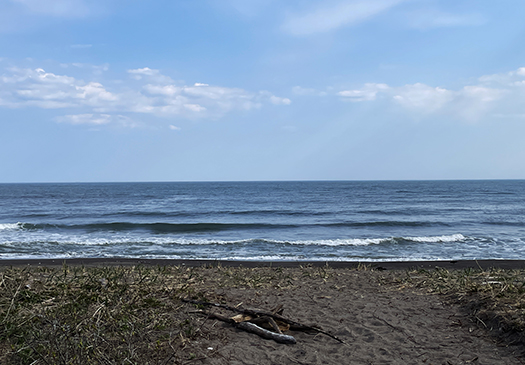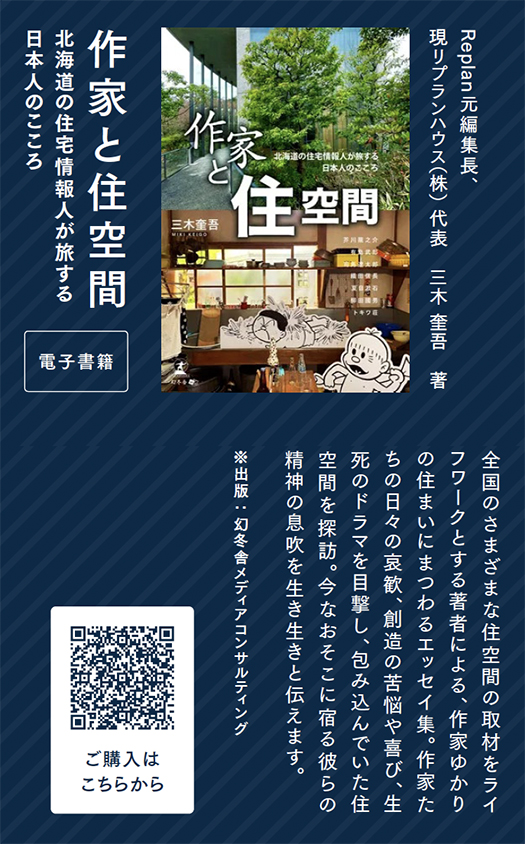
潮時、という言葉はいい意味でも、悪い意味でも使われる。「goo辞書」で見てみたら以下のよう。
<漁師たちは潮の満ち引きをよくみて漁をする。潮の変わり目が実は絶好のタイミングであることからこれを「潮時」と呼んだ。つまり本来の意味は「好機」なのである。しかし時が流れて人々はマイナスの意味での「やめるタイミング」を「潮時」という言葉に重ねてしまった。>とのこと。
写真は北海道釧路周辺での太平洋を見晴らした海岸線の光景ですが、こういう海の様子から航路の決断を下していく人びとの洞察力には本当に深く打たれる。そういう「先覚者」たちが時代というものを切り開いていくのでしょう。
現代の高齢化社会という局面では、国の運営というのはなかなか難しいだろうなぁと思う。わたし自身も高齢者になり、もうすぐ「後期高齢者」にも突入しそう。まぁ自分では可能な限り行動的に、まだまだ「未来投企」的に生きていたいと思ってはいますが、いろいろな外的・内的な環境要因は迫っても来る。やはりカラダからの「叫び声」というものには否応なく従っていく必要がある。輪廻、もしくは「定め」ということでしょう。
そういう声に耳を傾けながら、できることに取り組む、という一択なのでしょうね。

そんなことを考えながら、高齢期の自分に可能なこととして、ある特定テーマ、それも自分がこれまでやってきた人生行路の未来形ということで、先人の住宅事例を掘り下げて考えて見るという領域に取り組んでみた次第です。写真はReplan誌次号で告知していただける拙書の案内。「作家と住空間」というテーマ。まぁ「作家」という領域特定は比較的自由に考え、「織田信長と安土城」まで拡張していますが、テーマとしては逸脱はしていないと信じています。
まぁ自分自身の書籍出版というのははじめてで、高齢期とはいえ「未来投企」的なこころみ。
芭蕉はあの時代にあっては「高齢期」なのに、全国を巡り歩いてさまざまな句を読み続けていた。その足跡などもすこしづつたどっていますが、強く惹かれている。住宅という特定分野に特化はしていますが自分自身もこういう「表現」の分野で生きてきたので、この分野の先人の事跡がより大きな存在になって来ているのですね。
まぁムリをせずに、こういうテーマ探究を続けられたら良いなと思い定めている。いい潮時かな(笑)。
English version⬇
What is the meaning of “time of the tide” in life and in old age?
How should the country be steered and how should individuals live amidst the demographic change of an aging population? Is it a certain “time of the tide” for both the nation and human beings? …
The word “tide” can be used in a good or bad way. The goo dictionary says the following.
<Fishermen fish by carefully watching the ebb and flow of the tide. The turning of the tide is actually the best time to fish, so they call it “tidal time. In other words, the original meaning of the word was “good opportunity. However, as time went by, people began to use the term “tidal timing” in a negative sense, meaning “the right time to stop fishing. >The photo is from the Kushiro area in Hokkaido, Japan.
The photo is a view of the coastline overlooking the Pacific Ocean in the Kushiro area of Hokkaido, and I am truly struck by the insight of people who make decisions about navigation based on the state of the sea. Such “pioneers” are the ones who will pave the way for the times.
In today’s aging society, I think it must be quite difficult to manage a country. I myself have become an elderly person and will soon enter the “late elderly” period. Well, I would like to be as active as possible and still live in a “future-projecting” way, but various external and internal environmental factors are also approaching. I still need to follow the “cries” from my body, whether I like it or not. It may be called samsara, or “predestination.
I guess the only choice is to work on what we can do while listening to such a voice.
With this in mind, I have decided to delve into a particular theme as something I can do in my old age, and that is to look into the future of the path I have taken in my life, and to look at the housing examples of my predecessors. The photo is a guide to my book, which will be announced in the next issue of Replan magazine. The theme of the book is “Writers and Living Space. Well, I have taken a relatively liberal approach in specifying the domain of “writers” and extended it to “Nobunaga Oda and Azuchi Castle,” but I do not believe that I have deviated from the theme.
Well, this is the first time for me to publish my own book, and even though I am in my old age, it is a “future project” of mine.
Basho was in his “old age” at that time, but he continued to travel around the country and read a variety of haiku. I have been following his footsteps and am strongly attracted to his work. Although I specialize in a specific field of housing, I myself have lived in this field of “expression,” so the traces of my predecessors in this field are becoming more significant to me.
Well, I have decided that it would be good if I could continue to explore this kind of theme without being unreasonable. I guess it is a good time (laughs).
Posted on 5月 22nd, 2025 by 三木 奎吾
Filed under: 日本社会・文化研究







コメントを投稿
「※誹謗中傷や、悪意のある書き込み、営利目的などのコメントを防ぐために、投稿された全てのコメントは一時的に保留されますのでご了承ください。」
You must be logged in to post a comment.